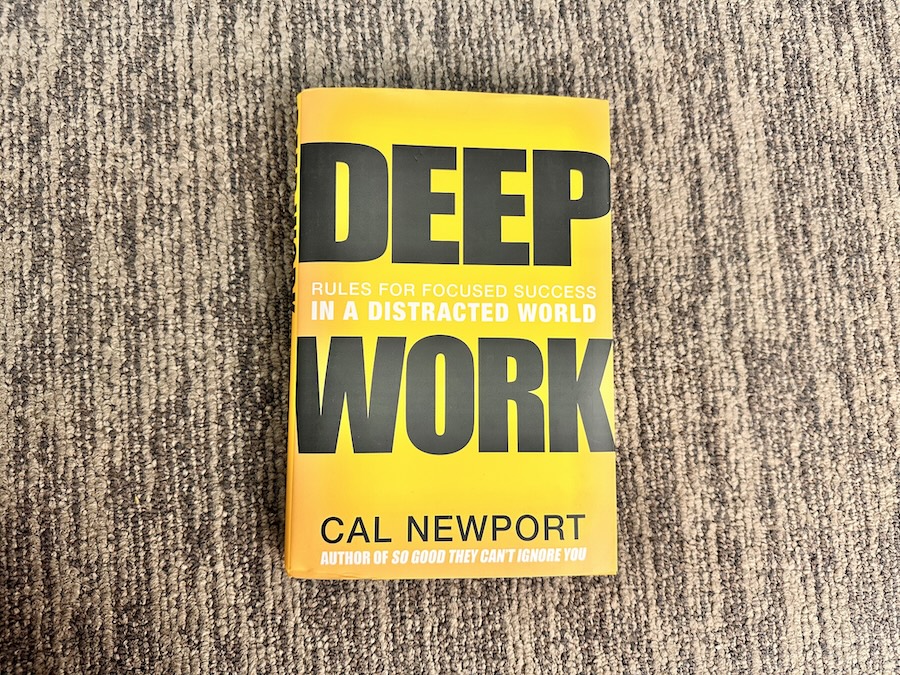Deep work: Rules for a Focused Success in a Distracted World

In "Deep Work: Rules for Focused Success in a Distracted World," Cal Newport presents a compelling argument for the necessity of deep work in an increasingly distracted society. He defines deep work as the ability to focus without distraction on cognitively demanding tasks, which allows individuals to produce high-quality work and master complex skills. In contrast, shallow work consists of non-cognitively demanding tasks that are often performed while distracted, leading to a lack of meaningful productivity.
Newport emphasizes that the capacity for deep work is becoming increasingly rare in our fast-paced, technology-driven world, yet it is more valuable than ever. He outlines four key rules to cultivate deep work habits: working deeply by establishing routines, embracing boredom to enhance focus, quitting social media to minimize distractions, and draining the shallows by reducing time spent on low-value tasks.
Here's a summary of the key points from "Deep Work: Rules for Focused Success in a Distracted World" by Cal Newport:
1. Deep work is defined as professional activities performed in a state of distraction-free concentration that push your cognitive capabilities to their limit. It creates new value, improves your skill, and is hard to replicate.
2. Shallow work, in contrast, refers to non-cognitively demanding, logistical-style tasks, often performed while distracted. These efforts tend not to create much new value and are easy to replicate.
3. The ability to perform deep work is becoming increasingly rare and valuable in our economy. Those who cultivate this skill will thrive professionally.
4. Newport proposes four "rules" for cultivating deep work:
- Rule #1: Work Deeply - Adopt rituals and routines to support regular deep work sessions.
- Rule #2: Embrace Boredom - Don't take breaks from distraction; instead take breaks from focus.
- Rule #3: Quit Social Media - Be more selective about your use of technology and social media.
- Rule #4: Drain the Shallows - Reduce or eliminate shallow work to make more time for deep work.
5. The book outlines different strategies for scheduling deep work, including the monastic, bimodal, rhythmic, and journalistic approaches.
6. Newport emphasizes the importance of creating a distraction-free environment and developing the ability to concentrate intensely.
7. He suggests techniques like time-blocking, setting a fixed schedule for ending work each day, and practicing productive meditation.
8. The author argues that by cultivating deep work, you can learn hard things quickly and produce at an elite level in terms of both quality and speed.
9. Deep work is not only professionally beneficial but also leads to a sense of true fulfillment in your work life.
10. The book concludes that deep work is a superpower in our increasingly competitive twenty-first-century economy, and those who cultivate it will thrive.
Through practical strategies and insights, Newport encourages readers to prioritize deep work in their professional lives, arguing that those who master this skill will stand out and thrive in their fields. Ultimately, "Deep Work" serves as a guide to reclaiming focus and achieving greater success in a world filled with distractions.
Newport emphasizes that the capacity for deep work is becoming increasingly rare in our fast-paced, technology-driven world, yet it is more valuable than ever. He outlines four key rules to cultivate deep work habits: working deeply by establishing routines, embracing boredom to enhance focus, quitting social media to minimize distractions, and draining the shallows by reducing time spent on low-value tasks.
Here's a summary of the key points from "Deep Work: Rules for Focused Success in a Distracted World" by Cal Newport:
1. Deep work is defined as professional activities performed in a state of distraction-free concentration that push your cognitive capabilities to their limit. It creates new value, improves your skill, and is hard to replicate.
2. Shallow work, in contrast, refers to non-cognitively demanding, logistical-style tasks, often performed while distracted. These efforts tend not to create much new value and are easy to replicate.
3. The ability to perform deep work is becoming increasingly rare and valuable in our economy. Those who cultivate this skill will thrive professionally.
4. Newport proposes four "rules" for cultivating deep work:
- Rule #1: Work Deeply - Adopt rituals and routines to support regular deep work sessions.
- Rule #2: Embrace Boredom - Don't take breaks from distraction; instead take breaks from focus.
- Rule #3: Quit Social Media - Be more selective about your use of technology and social media.
- Rule #4: Drain the Shallows - Reduce or eliminate shallow work to make more time for deep work.
5. The book outlines different strategies for scheduling deep work, including the monastic, bimodal, rhythmic, and journalistic approaches.
6. Newport emphasizes the importance of creating a distraction-free environment and developing the ability to concentrate intensely.
7. He suggests techniques like time-blocking, setting a fixed schedule for ending work each day, and practicing productive meditation.
8. The author argues that by cultivating deep work, you can learn hard things quickly and produce at an elite level in terms of both quality and speed.
9. Deep work is not only professionally beneficial but also leads to a sense of true fulfillment in your work life.
10. The book concludes that deep work is a superpower in our increasingly competitive twenty-first-century economy, and those who cultivate it will thrive.
Through practical strategies and insights, Newport encourages readers to prioritize deep work in their professional lives, arguing that those who master this skill will stand out and thrive in their fields. Ultimately, "Deep Work" serves as a guide to reclaiming focus and achieving greater success in a world filled with distractions.

